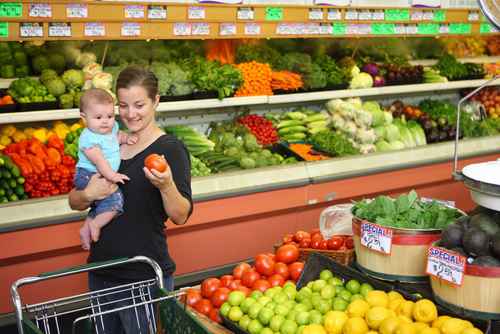
The Big Money Battle to Sway Americans’ Food Choices
When it comes to food in America, we’re witnessing a sea change. Organic sales jumped 11 percent last year. Meanwhile about 84 percent of U.S. consumers now say they buy at least some organic food and two-thirds of Americans are in favor of requiring labeling on products containing genetically modified (GMO) ingredients. So it’s not surprising that some large food companies are spending money to coax consumers back to their side of the aisle.
July 2, 2015 | Source: Civil Eats | by Elizabeth Grossman
When it comes to food in America, we’re witnessing a sea change. Organic sales jumped 11 percent last year. Meanwhile about 84 percent of U.S. consumers now say they buy at least some organic food and two-thirds of Americans are in favor of requiring labeling on products containing genetically modified (GMO) ingredients. So it’s not surprising that some large food companies are spending money to coax consumers back to their side of the aisle.
What might be surprising is just how much they’re spending. According to a new report released by Friends of the Earth (FOE), a group of organizations or “front groups” associated with producers of conventional and genetically engineered food spent $126 million on these efforts between 2009 and 2013.
The report, Spinning Food, looks at spending by 14 groups associated with agricultural chemical, processed food and industrial livestock producers, and their trade associations. Rather than aiming their lobbying efforts at elected officials, these groups target consumers, hoping to sway them with highly persuasive websites, social media and targeted messaging campaigns. While each campaign is different, most tout the benefits of GMOs, work to debunk what they call the “exaggerated benefits of organic food,” and attempt to separate “fact from fiction on all things food.”
Many of the groups profiled in the report have similar names: Coalition for Safe & Affordable Food, Center for Food Integrity, Center for Consumer Freedom, International Food Information Council, U.S. Farmers and Ranchers Alliance, and Council for Biotechnology Information. The report calls out these groups’ affiliations with companies and trade associations that include Bayer, Chevron, CocaCola, CropLife America, Dow Chemical, DuPont, Grocery Manufacturers’ Association, McDonald’s, Monsanto, National Pork Board, National Restaurant Association, Syngenta, Tyson Foods, and United Soybean Board.
“They’re pushing hard on the organic-is-not-worth-the-money angle and trying to paint organic as elitist—and on anti-labeling laws,” says report co-author Stacy Malkan and co-director of consumer advocacy organization U.S. Right to Know, of the groups profiled in the report.
A close look at some of these groups’ “explainers” suggests they may swimming against the tide—with statements asserting that use of antibiotics on livestock is unrelated to the spread of antibiotic resistant bacteria and that environmental impacts and worker safety are outside what should be considered “benefits” of organic food, and asking consumers to support legislation that would create a federal GMO-labeling program but prevent states from taking such action.
In addition to targeting consumers, the report outlines how organizations’ messages are making their way into the news media using what report authors call “a host of covert communications tactics.”
The report details well-funded campaigns that include panel discussions promoted through organization websites such as the U.S. Farmers and Ranchers Alliance’s “Food Dialogues,” media appearances by organizational spokespeople and members, op-eds, and prominently placed ads.
“It’s stunning how much money” is being spent this way, said Malkan in an interview with Civil Eats.
The food industry and groups named by FOE are not responding kindly to the report. “A 62-page report attacking farmers can’t cover up the fact that Friends of the Earth is a science denier on the issue of genetically improved crops,” said the Center for Consumer Freedom’s director of research Will Coggin in a statement. The produce industry’s online news site The Packer called the report “a contrived broadside.”
